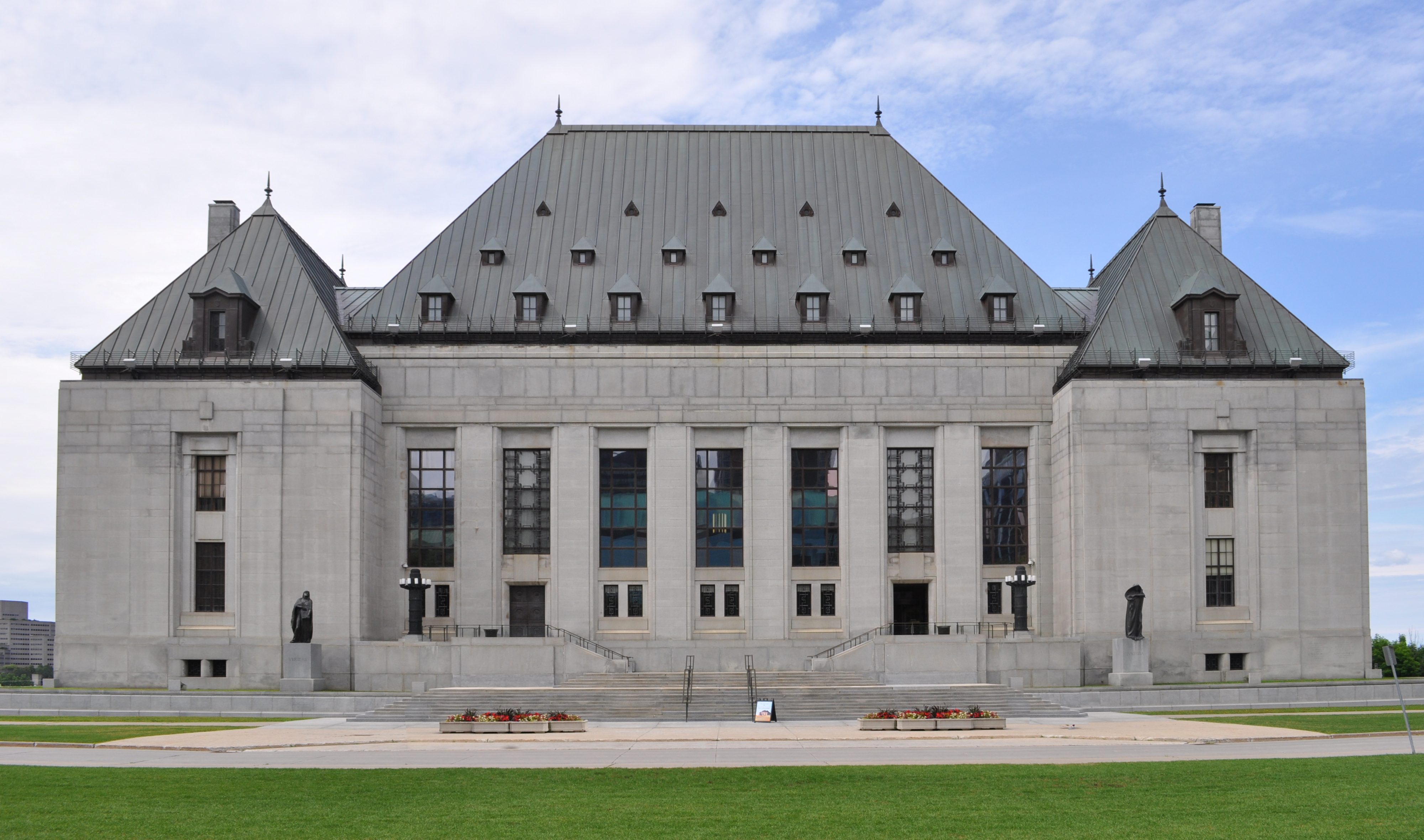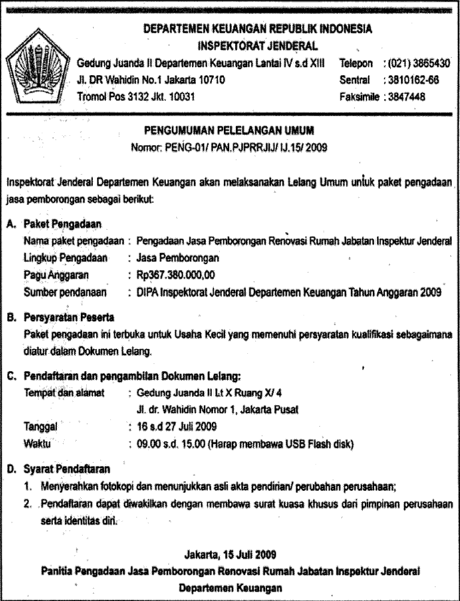|
Contract B
The terms Contract A and Contract B in Canadian contract law refer to a concept applied by the Canadian courts regarding the fair and equal treatment of bidders in a contract tendering process, for example to award a construction contract. Essentially this concept formalizes previously applied precedents and strengthens the protection afforded to those who submit bids in the tendering process. The concept was introduced in 1981 by the Supreme Court of Canada, in '' R. v. Ron Engineering and Construction (Eastern) Ltd''. The court found that a " duty of fairness" was owed to all bidders by an owner in a tendering process. A Contract A, a "process contract", is formed between the owner (person, company or organization tendering the project) and each bidder when a "request for proposal" is responded to in the form of a compliant bid, sometimes also known as submission of price. The owner must deal fairly and equally with all bidders, and must not show any favouritism or prejudice to ... [...More Info...] [...Related Items...] OR: [Wikipedia] [Google] [Baidu] |
Canadian Contract Law
Canadian contract law is composed of two parallel systems: a common law framework outside Québec and a Civil law (legal system), civil law framework within Québec. Outside Québec, Canadian contract law is derived from English contract law, though it has developed distinctly since Canadian Confederation in 1867. While Québecois contract law was originally derived from that which existed in France at the time of Québec's annexation into the British Empire, it was overhauled and codified first in the ''Civil Code of Lower Canada'' and later in the current ''Civil Code of Quebec'', which codifies most elements of contract law as part of its provisions on the broader law of obligations. Individual common law provinces have codified certain contractual rules in a ''Sale of Goods Act'', resembling equivalent statutes elsewhere in the Commonwealth. As most aspects of contract law in Canada are the subject of provincial jurisdiction under Section 92(13) of the Constitution Act, 1867, t ... [...More Info...] [...Related Items...] OR: [Wikipedia] [Google] [Baidu] |
Contract B
The terms Contract A and Contract B in Canadian contract law refer to a concept applied by the Canadian courts regarding the fair and equal treatment of bidders in a contract tendering process, for example to award a construction contract. Essentially this concept formalizes previously applied precedents and strengthens the protection afforded to those who submit bids in the tendering process. The concept was introduced in 1981 by the Supreme Court of Canada, in '' R. v. Ron Engineering and Construction (Eastern) Ltd''. The court found that a " duty of fairness" was owed to all bidders by an owner in a tendering process. A Contract A, a "process contract", is formed between the owner (person, company or organization tendering the project) and each bidder when a "request for proposal" is responded to in the form of a compliant bid, sometimes also known as submission of price. The owner must deal fairly and equally with all bidders, and must not show any favouritism or prejudice to ... [...More Info...] [...Related Items...] OR: [Wikipedia] [Google] [Baidu] |
Canadian Business Law
Canadians () are people identified with the country of Canada. This connection may be residential, legal, historical or cultural. For most Canadians, many (or all) of these connections exist and are collectively the source of their being ''Canadian''. Canada is a multilingual and multicultural society home to people of groups of many different ethnic, religious, and national origins, with the majority of the population made up of Old World immigrants and their descendants. Following the initial period of French and then the much larger British colonization, different waves (or peaks) of immigration and settlement of non-indigenous peoples took place over the course of nearly two centuries and continue today. Elements of Indigenous, French, British, and more recent immigrant customs, languages, and religions have combined to form the culture of Canada, and thus a Canadian identity and Canadian values. Canada has also been strongly influenced by its linguistic, geographic, ... [...More Info...] [...Related Items...] OR: [Wikipedia] [Google] [Baidu] |
Reverse Auction
Reverse or reversing may refer to: Arts and media * ''Reverse'' (Eldritch album), 2001 * ''Reverse'' (2009 film), a Polish comedy-drama film * ''Reverse'' (2019 film), an Iranian crime-drama film * ''Reverse'' (Morandi album), 2005 * ''Reverse'' (TV series), a 2017–2018 South Korean television series *"Reverse", a 2014 song by SomeKindaWonderful * REVERSE art gallery, in Brooklyn, NY, US * Reverse tape effects including backmasking, the recording of sound in reverse * '' Reversing: Secrets of Reverse Engineering'', a book by Eldad Eilam *''Tegami Bachi: REVERSE'', the second season of the '' Tegami Bachi'' anime series, 2010 Driving * Reverse gear, in a motor or mechanical transmission * Reversing (vehicle maneuver), reversing the direction of a vehicle * Turning a vehicle through 180 degrees Sports and games * Reverse (American football), a trick play in American football * Reverse swing, a cricket delivery * Reverse (bridge), a type of bid in contract bridge Technology ... [...More Info...] [...Related Items...] OR: [Wikipedia] [Google] [Baidu] |
Duty Of Fairness
A duty (from "due" meaning "that which is owing"; , past participle of ; , whence "debt") is a commitment or expectation to perform some action in general or if certain circumstances arise. A duty may arise from a system of ethics or morality, especially in an honor culture. Many duties are created by law, sometimes including a codified punishment or liability for non-performance. Performing one's duty may require some sacrifice of self-interest. A sense-of-duty is also a virtue or personality trait that characterizes someone who is diligent about fulfilling individual duties or who confidently knows their calling. A sense-of-duty can also come from a need to fulfill familial pressures and desires. This is typically seen in a militaristic or patriotic way. A distinction is commonly made between "positive duties", which a person must undertake, and "negative duties", which relate to actions from which a person must refrain. Michael Freeman notes that negative duties may be e ... [...More Info...] [...Related Items...] OR: [Wikipedia] [Google] [Baidu] |
Call For Bids
An invitation to tender (ITT, also known as a call for bids or a request for tenders) is a formal, structured procedure for generating competing offers from different potential suppliers or contractors looking to obtain an award of business activity in works, supply, or service contracts, often from companies who have been previously assessed for suitability by means of a supplier questionnaire (SQ) or pre-qualification questionnaire (PQQ). Unlike a request for proposal (RFP), which is used when a company sources for business proposals, ITTs are used when a government or company does not require the submission of an original business proposal and is looking solely to award a contract based on the best tender submitted. As a result, whereas ITTs are often decided based on the best price offered, decisions on RFPs may also involve other considerations such as technology and innovation. Both are forms of reverse auction. At the same time, variants may be requested in an ITT, whic ... [...More Info...] [...Related Items...] OR: [Wikipedia] [Google] [Baidu] |
Privilege Clause
Privilege may refer to: Arts and entertainment * ''Privilege'' (film), a 1967 film directed by Peter Watkins * ''Privilege'' (Ivor Cutler album), 1983 * ''Privilege'' (Television Personalities album), 1990 * '' Privilege (Abridged)'', an album by Parenthetical Girls, 2013 * " Privilege (Set Me Free)", a 1978 song by the Patti Smith Group * "Privilege" (''Law & Order: Criminal Intent''), a television episode * "Privilege", a short story by Frederick Forsyth included in the collection '' No Comebacks'' * "Privilege", a song by Kevin Federline from the album ''Playing with Fire'' (Kevin Federline album) Business * Privilege (insurance company), a division of the Royal Bank of Scotland * Privilege Ibiza, a nightclub in Ibiza, Spain * Privilege Style, a Spanish charter airline * Printing privilege, a precursor of copyright conferring exclusive publishing rights Society and politics * Privilege (evidence), rules excluding certain confidential communication from being admissi ... [...More Info...] [...Related Items...] OR: [Wikipedia] [Google] [Baidu] |
Vicarious Liability
Vicarious liability is a form of a strict, secondary liability that arises under the common law doctrine of agency, '' respondeat superior'', the responsibility of the superior for the acts of their subordinate or, in a broader sense, the responsibility of any third party that had the "right, ability, or duty to control" the activities of a violator. It can be distinguished from contributory liability, another form of secondary liability, which is rooted in the tort theory of enterprise liability because, unlike contributory infringement, knowledge is not an element of vicarious liability. The law has developed the view that some relationships by their nature require the person who engages others to accept responsibility for the wrongdoing of those others. The most important such relationship for practical purposes is that of employer and employee. Employers' liability Employers are vicariously liable, under the '' respondeat superior'' doctrine, for negligent acts or omi ... [...More Info...] [...Related Items...] OR: [Wikipedia] [Google] [Baidu] |
Court System Of Canada
The court system of Canada is made up of many courts differing in levels of legal superiority and separated by jurisdiction. In the courts, the judiciary interpret and apply the law of Canada. Some of the courts are federal in nature, while others are provincial or territorial. The Constitution of Canada gives the federal Parliament of Canada exclusive jurisdiction in criminal law, while the provinces have exclusive control over much of civil law. Each province has authority over the administration of justice within that province. Most cases are heard in provincial and territorial courts. Provincial and territorial superior courts have inherent jurisdiction over civil and criminal cases. Provincial and territorial lower courts try most criminal offences, small civil claims, and some family matters. The smaller federal court system consists of the Federal Court, Federal Court of Appeal, and Tax Court. There are also the courts martial, for military offences, with ... [...More Info...] [...Related Items...] OR: [Wikipedia] [Google] [Baidu] |
Prejudice
Prejudice can be an affect (psychology), affective feeling towards a person based on their perceived In-group and out-group, social group membership. The word is often used to refer to a preconceived (usually unfavourable) evaluation or classification of another person based on that person's perceived personal characteristics, such as political affiliation, sex, gender, gender identity, beliefs, Value (personal and cultural), values, social class, friendship, Ageing, age, disability, religion, sexual orientation, sexuality, Race (human classification), race, ethnicity, language, nationality, culture, complexion, beauty, height, body weight, job, occupation, wealth, education, criminality, Fan loyalty, sport-team affiliation, Psychology of music preference, music tastes or other perceived characteristics. The word "prejudice" can also refer to unfounded or pigeonholed beliefs and it may apply to "any unreasonable attitude that is unusually resistant to rational influence". Gordon ... [...More Info...] [...Related Items...] OR: [Wikipedia] [Google] [Baidu] |
Court Of Appeal For British Columbia
The British Columbia Court of Appeal (BCCA) is the highest appellate court in the province of British Columbia, Canada. It was established in 1910 following the 1907 Court of Appeal Act. Jurisdiction The BCCA hears appeals from the Supreme Court of British Columbia and a number of boards and tribunals. The BCCA also hears criminal appeals from the Provincial Court of British Columbia where the proceedings in that court were by indictment. It will hear summary conviction appeals from the Supreme Court on criminal matters that originated in the Provincial Court. Statute restricts appeals on civil matters from the Provincial Court (Small Claims) to the Supreme Court. However, some Provincial Court civil matters may come before the BCCA on very narrow matters having to do with questions of administrative law or other unusual circumstances. Composition The BCCA consists of 15 justices (including a chief justice) in addition to 9 supernumerary justices. All justices of the BCC ... [...More Info...] [...Related Items...] OR: [Wikipedia] [Google] [Baidu] |


